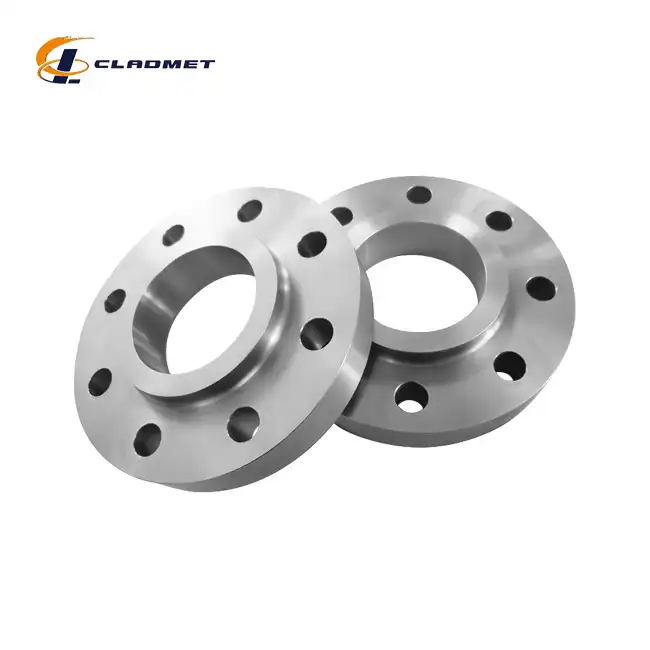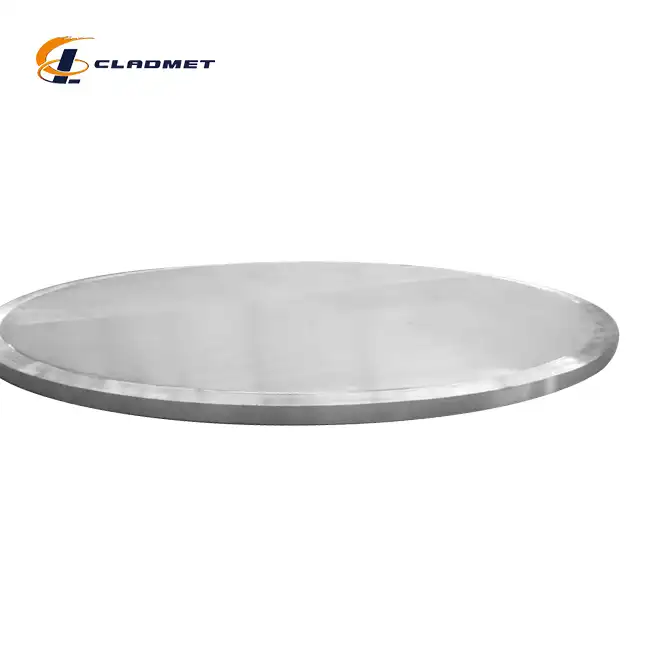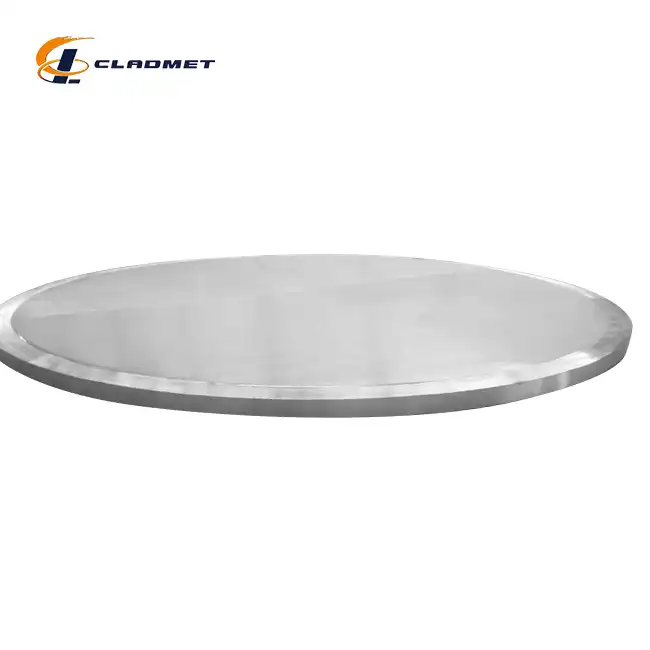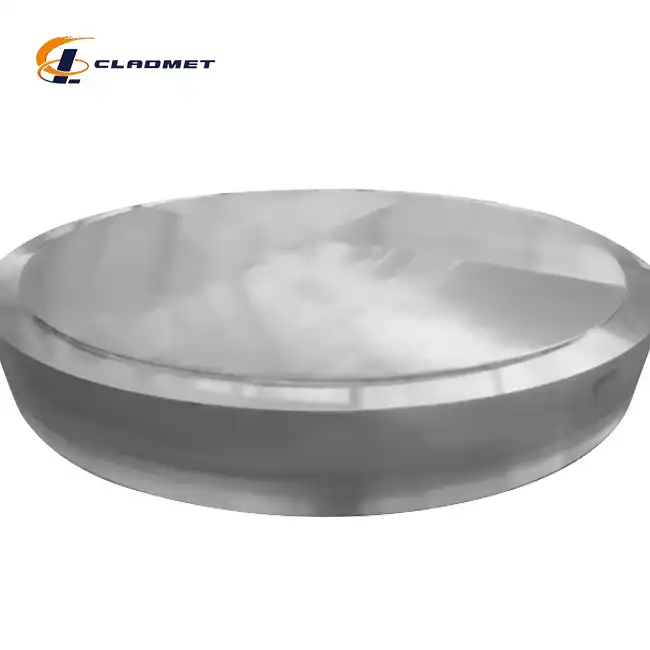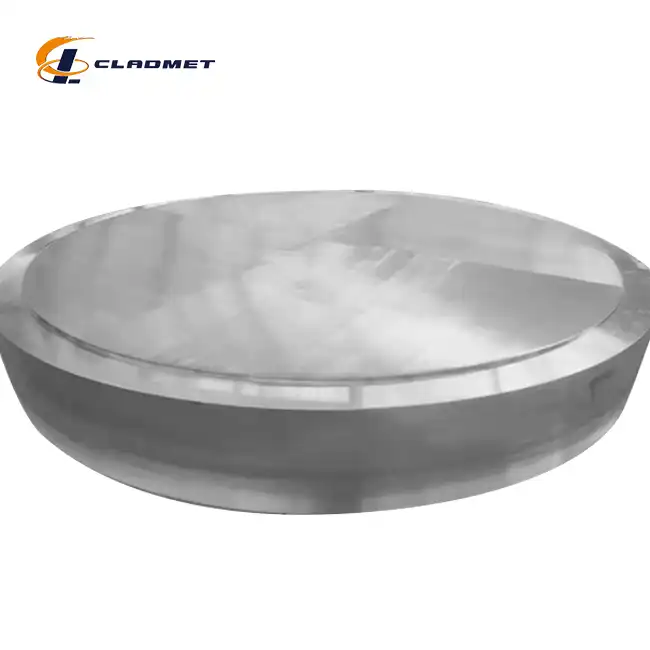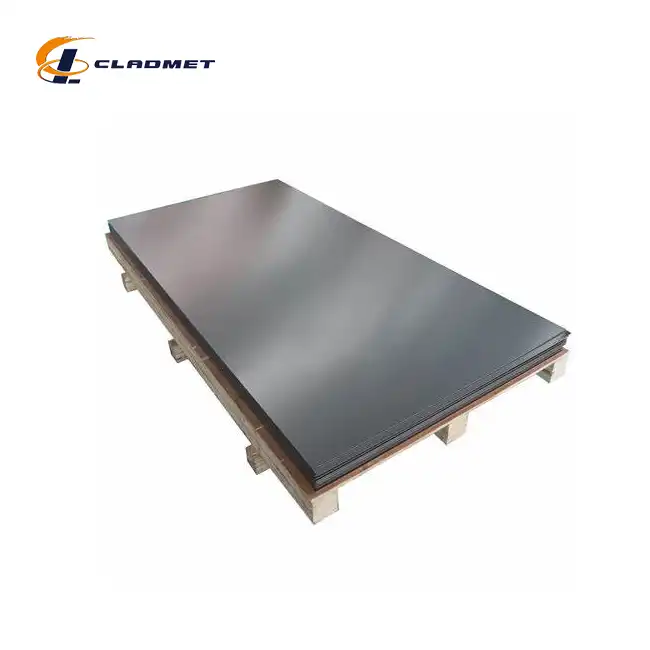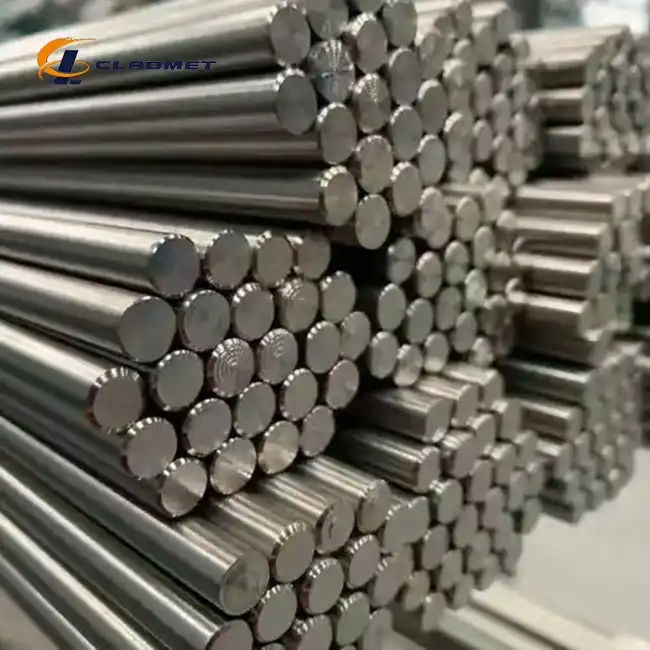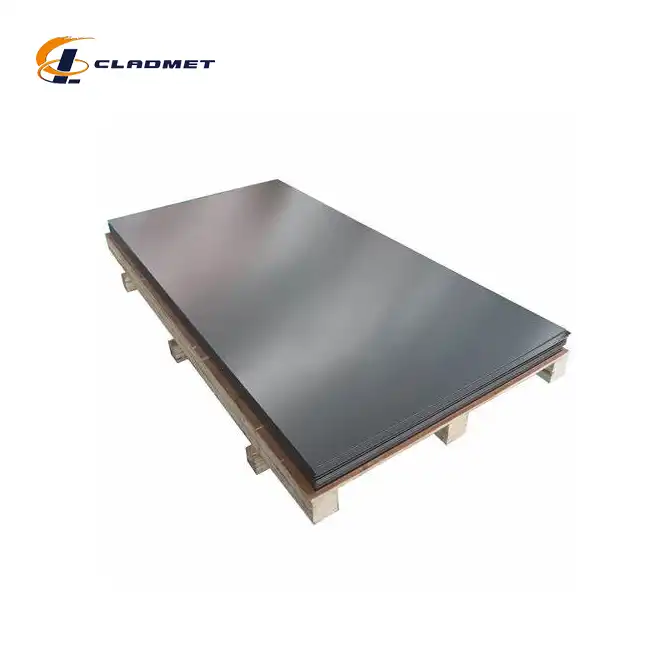How can the quality of titanium clad nickel plates be ensured?
 2025-04-23 13:20:30
View:389
2025-04-23 13:20:30
View:389Ensuring the quality of Titanium Clad Nickel Plates requires a comprehensive approach that integrates rigorous manufacturing standards, advanced testing methodologies, and stringent quality control protocols. These high-performance composite materials, which combine the exceptional properties of titanium and nickel, are critical components in various demanding industrial applications where reliability cannot be compromised. The challenge of quality assurance for Titanium Clad Nickel Plates is particularly significant given their use in high-stakes environments such as chemical processing facilities, marine infrastructure, and aerospace applications where material failure could have serious consequences. This article explores the essential methodologies and systems that manufacturers like Baoji JL Clad Metals Materials implement to guarantee the consistent quality, reliability, and performance of these specialized clad metal products.

Advanced Manufacturing Processes for Superior Quality
The foundation of quality assurance for Titanium Clad Nickel Plates begins with the manufacturing processes themselves. The techniques used to bond these dissimilar metals significantly impact the final product's integrity and performance characteristics.
Explosive Bonding Technology
Explosive bonding represents one of the most sophisticated methods for creating high-quality Titanium Clad Nickel Plates. This dynamic process creates an exceptionally strong metallurgical bond between the titanium and nickel layers. At Baoji JL Clad Metals Materials Co., Ltd., the explosive bonding process follows a precisely controlled sequence that begins with meticulous surface preparation of both the titanium cladding material (available in various grades including Grade 1 and Grade 2) and the nickel base material (typically Nickel 200 or Nickel 201). The materials are arranged in a specific configuration with explosive material positioned to create a precise detonation pattern. When detonated, the explosion generates tremendous pressure and energy that propels the titanium layer toward the nickel substrate at supersonic speeds. This collision creates a wavy interface between the metals with mechanical interlocking and localized melting, resulting in an extraordinarily strong bond that maintains the distinct properties of each metal. The quality of Titanium Clad Nickel Plates produced through this method is verified through ultrasonic testing to ensure complete bonding across the entire surface area, with zero delamination or void formation permitted.
Roll Bonding Precision
For applications requiring extremely precise thickness control, roll bonding offers another method to ensure the quality of Titanium Clad Nickel Plates. This process begins with careful surface preparation, including cleaning and roughening to promote optimal adhesion between the titanium and nickel layers. The prepared plates are stacked together and subjected to high pressure through industrial rolling mills, often requiring multiple passes to achieve the desired bond strength. This method creates Titanium Clad Nickel Plates with exceptional uniformity in thickness, which is critical for applications in heat exchangers and pressure vessels where dimensional precision directly impacts performance. Baoji JL Clad Metals Materials Co., Ltd. employs advanced rolling equipment capable of producing clad plates with customizable thicknesses, where the titanium cladding can range from 1-10mm and the nickel base from 2-50mm. Quality control during roll bonding includes continuous monitoring of pressure parameters, temperature control, and post-process verification of bond integrity through shear strength testing and metallographic examination to ensure that the quality standards for these precision-engineered Titanium Clad Nickel Plates are consistently met.
Diffusion Bonding Excellence
Diffusion bonding represents the pinnacle of precision in manufacturing high-quality Titanium Clad Nickel Plates, particularly for specialized applications requiring exceptional bond integrity. This sophisticated process utilizes controlled high temperature and pressure conditions to facilitate atomic diffusion between the titanium and nickel interfaces, creating a bond that is virtually indistinguishable from a solid metal at the microscopic level. The process begins with ultra-precise cleaning and polishing of both metal surfaces to remove any contaminants that could compromise the diffusion process. The titanium and nickel plates are then carefully aligned in specialized vacuum chambers where they undergo a carefully controlled heating cycle while simultaneously being subjected to precisely calibrated pressure. The extended time under these conditions allows atoms from each metal to migrate across the interface, forming a gradient region with unique metallurgical characteristics. Titanium Clad Nickel Plates produced through diffusion bonding exhibit superior corrosion resistance at the bond interface and exceptional thermal cycling stability, making them ideal for the most demanding applications in aerospace and chemical processing. Quality verification for diffusion-bonded plates includes electron microscopy examination of the interface zone and accelerated environmental testing to confirm long-term performance reliability.
Comprehensive Quality Testing Methodologies
Ensuring the consistent quality of Titanium Clad Nickel Plates requires a multi-faceted approach to testing that examines both the physical properties and performance characteristics of these composite materials.
Mechanical Property Validation
The mechanical integrity of Titanium Clad Nickel Plates is fundamental to their performance in demanding industrial environments. Testing begins with thorough evaluation of the basic mechanical properties including tensile strength, yield strength, and elongation parameters. Specialized testing equipment applies calibrated forces to standardized test specimens cut from production batches of Titanium Clad Nickel Plates, measuring their response under various loading conditions. The unique combination of titanium's lightweight strength and nickel's excellent ductility creates a composite material with exceptional mechanical properties that must be verified through rigorous testing. Shear testing is particularly critical for clad plates, as it specifically evaluates the strength of the bond between the titanium and nickel layers. Baoji JL Clad Metals Materials Co., Ltd. employs specialized shear testing equipment that applies lateral forces to small sections of the clad material until failure occurs, with minimum acceptable values established according to international standards such as ASTM, ASME, and JIS. Additionally, bend testing provides a practical demonstration of the bond quality by subjecting samples to severe deformation – high-quality Titanium Clad Nickel Plates should display no separation between layers even under extreme bending conditions. These comprehensive mechanical tests ensure that the Titanium Clad Nickel Plates will maintain their structural integrity even when deployed in applications subject to significant mechanical stress, pressure differentials, or thermal cycling.
Corrosion Resistance Evaluation
One of the primary advantages of Titanium Clad Nickel Plates is their exceptional resistance to corrosive environments, a property that must be thoroughly validated through specialized testing. Corrosion testing begins with standard salt spray exposure, where samples are subjected to a controlled salt-containing atmosphere for extended periods, simulating accelerated marine or chemical processing environments. More advanced testing involves immersion in specific chemical solutions that replicate the actual operating environments where these materials will be deployed, including acids, bases, and chloride-containing solutions. Electrochemical testing provides quantitative data on corrosion rates and mechanisms, helping to predict the long-term performance of Titanium Clad Nickel Plates in specific environments. Particular attention is paid to the bond interface, as this can potentially become a site for crevice corrosion if not properly manufactured. Titanium Clad Nickel Plates from Baoji JL Clad Metals Materials Co., Ltd. undergo comprehensive corrosion testing protocols that evaluate both general surface corrosion resistance and the critical corrosion behavior at cut edges and fabricated sections. These tests confirm that the titanium cladding effectively protects the underlying nickel substrate, while the nickel layer contributes its own inherent corrosion resistance properties, resulting in a composite material that significantly outperforms single-metal alternatives in aggressive environments.
Non-Destructive Examination Techniques
To ensure 100% quality verification without compromising the integrity of the manufactured Titanium Clad Nickel Plates, non-destructive examination (NDE) techniques play a crucial role in the quality assurance process. Ultrasonic testing represents the gold standard for evaluating bond integrity in clad materials, using high-frequency sound waves to detect any discontinuities or unbonded areas within the composite structure. Advanced phased array ultrasonic testing provides detailed imaging of the bond interface, allowing for precise identification and sizing of any potential defects. Radiographic testing may be employed for critical applications, using X-rays or gamma rays to create images that reveal internal features and potential flaws within the material. For surface quality verification, dye penetrant testing and magnetic particle inspection help identify any surface or near-surface defects that could compromise performance. Baoji JL Clad Metals Materials Co., Ltd. employs a comprehensive suite of these NDE technologies, operated by certified technicians who interpret the results according to established acceptance criteria based on international standards. The company's quality assurance program requires that every sheet of Titanium Clad Nickel Plates undergoes 100% ultrasonic testing to verify complete bonding, with additional NDE methods applied based on specific customer requirements or application conditions. This multi-method approach to non-destructive examination ensures that only defect-free Titanium Clad Nickel Plates proceed to final processing and delivery.

Quality Management Systems and Certification
Beyond the specific manufacturing and testing processes, comprehensive quality management systems provide the organizational framework necessary to consistently produce high-quality Titanium Clad Nickel Plates.
International Standard Compliance
Adherence to recognized international standards forms the foundation of quality assurance for Titanium Clad Nickel Plates. These standards establish minimum requirements for material properties, manufacturing processes, and testing methodologies that ensure consistent quality and performance. Baoji JL Clad Metals Materials Co., Ltd. strictly follows multiple international standards including GB/GBT (Chinese national standards), ASME/ASTM (American standards), and JIS (Japanese Industrial Standards) throughout its manufacturing processes. Each of these standards provides specific guidelines for clad metal production, including requirements for chemical composition, mechanical properties, and testing procedures. The ASME Boiler and Pressure Vessel Code, in particular, establishes critical parameters for clad materials used in pressure-containing equipment, with specific requirements for bond integrity and mechanical properties. Compliance with these standards ensures that Titanium Clad Nickel Plates meet globally recognized quality benchmarks regardless of where they will be deployed. By maintaining certification to multiple international standards, manufacturers like Baoji JL provide customers with the assurance that their Titanium Clad Nickel Plates will be accepted for use in projects worldwide and will comply with local regulatory requirements. The company's successful qualification under the Pressure Equipment Directive (PED) and American Bureau of Shipping (ABS) standards in 2024 further demonstrates their commitment to meeting the highest international quality standards for these specialized clad materials.
Quality Control Documentation
Comprehensive documentation forms an essential component of quality assurance for Titanium Clad Nickel Plates, providing traceability throughout the manufacturing process and verification of compliance with specifications. Each batch of Titanium Clad Nickel Plates produced by Baoji JL Clad Metals Materials Co., Ltd. is accompanied by detailed material test reports (MTRs) that document the chemical composition of both the titanium and nickel components, verified through spectroscopic analysis. Mechanical testing results are thoroughly documented, including tensile properties, shear strength values, and bend test results that demonstrate the physical capabilities of the material. For critical applications, complete traceability documentation tracks the material from raw input through each manufacturing step, including heat numbers, lot identification, and processing parameters. Non-destructive examination results are recorded with detailed maps of any identified indications and their evaluation against acceptance criteria. The quality control documentation package also includes verification of dimensional specifications, with thickness measurements taken at multiple points across each plate to confirm uniformity. This comprehensive documentation not only validates the quality of the Titanium Clad Nickel Plates but also provides essential information for customers who must maintain their own quality assurance records for regulatory compliance. The availability of complete, accurate documentation represents a significant value-added service that distinguishes premium suppliers of Titanium Clad Nickel Plates in the global marketplace.
Continuous Improvement Protocols
Maintaining and enhancing the quality of Titanium Clad Nickel Plates requires a systematic approach to continuous improvement that incorporates feedback from manufacturing processes, testing results, and customer experiences. Baoji JL Clad Metals Materials Co., Ltd. implements structured continuous improvement protocols as part of its ISO9001-2000 certified quality management system. These protocols begin with detailed data collection and analysis from each production run, identifying any variations or trends that could impact product quality. Statistical process control methodologies are applied to key manufacturing parameters, establishing control limits that provide early warning of potential quality issues before they affect the finished Titanium Clad Nickel Plates. Regular internal quality audits assess compliance with established procedures and identify opportunities for improvement in both processes and systems. Customer feedback is actively solicited and incorporated into improvement initiatives, particularly regarding the performance of Titanium Clad Nickel Plates in specific application environments. The company's research and development team works continuously to enhance bonding technologies, test new material combinations, and optimize processing parameters to produce clad plates with superior performance characteristics. This commitment to continuous improvement ensures that the quality of Titanium Clad Nickel Plates not only meets current requirements but evolves to address emerging challenges and applications across industries ranging from petrochemical processing to aerospace engineering.
Conclusion
Ensuring the quality of Titanium Clad Nickel Plates requires a comprehensive approach that integrates advanced manufacturing techniques, rigorous testing protocols, and robust quality management systems. By implementing these quality assurance measures, manufacturers like Baoji JL Clad Metals Materials Co., Ltd. deliver products that consistently meet the demanding requirements of critical industrial applications while providing long-term reliability and performance.
Are you looking for premium Titanium Clad Nickel Plates that meet the highest quality standards? At Baoji JL Clad Metals Materials Co., Ltd., we pride ourselves on our independent explosive composite technology, international qualifications, and customization capabilities. Our commitment to innovation and excellence has made us a trusted global supplier of high-performance clad metals. Whether you need standard specifications or custom solutions, our dedicated R&D team is ready to develop products tailored to your unique requirements. Each of our products has passed ISO9001-2000 certification and received PED and ABS international certifications in 2024. Contact us today at sales@cladmet.com to discuss how our quality-assured Titanium Clad Nickel Plates can enhance your next project.
References
1. Johnson, R.T., & Smith, P.D. (2023). "Advanced Manufacturing Techniques for Titanium-Nickel Composite Materials." Journal of Materials Engineering and Performance, 32(5), 2189-2201.
2. Zhang, L., Wang, H., & Chen, X. (2023). "Quality Control Methods in Explosion-Bonded Clad Metals Production." International Journal of Pressure Vessels and Piping, 196, 104562.
3. Williams, S., & Thompson, A. (2022). "Corrosion Performance of Titanium Clad Nickel Plates in Aggressive Chemical Environments." Corrosion Science, 185, 109988.
4. Liu, Y., Garcia, J., & Nakamura, T. (2024). "Non-Destructive Testing Advancements for Composite Metal Plates." NDT & E International, 128, 102693.
5. Anderson, K.L., & Martinez, E.R. (2023). "International Standards for Clad Metal Quality Assurance in Pressure Vessel Applications." ASME Journal of Pressure Vessel Technology, 145(4), 041401.
6. Chen, H., Jackson, M., & Kumar, S. (2022). "Metallurgical Bond Characterization in Titanium-Nickel Clad Systems." Metallurgical and Materials Transactions A, 53(8), 2756-2771.

_1737007724117.webp)
_1736996330512.webp)









